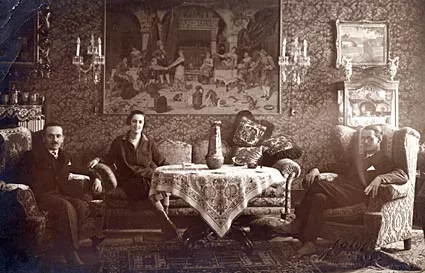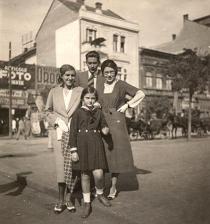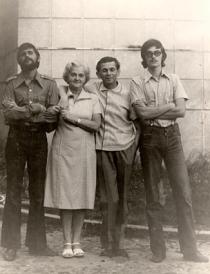Karoly Riemer at Ilonka Erdos’ place
This picture postcard was made in January 1928 and my stepfather Karoly Riemer is in it in the armchair on the right, right in the middle that's Ilonka, a beautiful woman. Next to her that's her husband Mor Erdos, an engineer. On the postcard it says: 'Dear Rozsika and Bela! I'd like to take the opportunity to send you a picture of ourselves. The other man in the picture is not a family friend, he's my brother-in-law. I hope you're all well, Ilonka is in Vasarhely and nurses my mother-in-law. We'll arrive in Kolozsvar at the end of February... Love from Mor Erdos.'
In 1928 my stepfather wasn't yet my mother's husband, but in the meantime I got this picture no that long ago from someone and kept it because I really liked him, he was an outstanding person and practically he raised me since I was in the second grade of elementary school.
While I was still a very little child, I too used to visit this house, when Karoly Riemer wasn't yet my mother's husband, but the families were anyway on very good terms.That big picture on the wall it's a tapestry, if I remember well, but I'm not sure.
My stepfather, Karoly Riemer, graduated the Commercial Academy from Vienna. He got to the front line as an ensign, and he was taken prisoner in 1915 already. He came home from Russian captivity in 1922. He was in many places, but at the end he got to Tashkent [Uzbekistan].
My stepfather wasn't religious at all. They were assimilated Jews, they had the Jewish consciousness, but they weren't religious. Grandpa Riemer also began from nothing, and according to his wife, my step-grandmother, after the first year of marriage they were very happy they managed to buy a mattress, because until then they slept on a straw mattress. So they achieved what they had with their own hands. But they educated their children, everyone learned music. My stepfather attended the Commercial Academy in Vienna, and his next son, Oszkar Riemer, graduated high school and later he got to the front and died as a hero in World War I. There is a war memorial column in the Jewish cemetery in Marosvasarhely, which lists all the Jewish soldiers who died as heroes. Oszkar Riemer is one of them, moreover, as far as I know there is a memorial in the Reformed cemetery, as well, which also lists the soldiers who died during World War I.
They had a sister, Ilonka, who got married in Kolozsvar, she was a beautiful woman. Her husband was Mor Erdos, a Jewish engineer. Ilonka was a housewife, she wasn't entirely healthy, so Mor spoiled her, he was worried about her. They lived a very nice life, but they had no children. She had a beautiful voice, she was a good piano player, and they traveled a lot together. They had a very elegant, civilized home, a home of a couple of high intellect - the husband earned probably well as engineer.
He built forest railways, as far az I know, but later he gave up this occupation and (when I was already part of his family) he had an wholesale store in Kolozsvar. They moved from this apartment to another one, which was also beautiful, big and splendid. When I came back from the deportation, I found out she, together with her husband, they were in Kolozsvar during the Holocaust because there was a Hungarian surgery professor, Klimko, who saved them and others, as well. He kept them in the hospital, so he didn't extradite them when they wanted to take them away [to deport them]. So they both survived.























